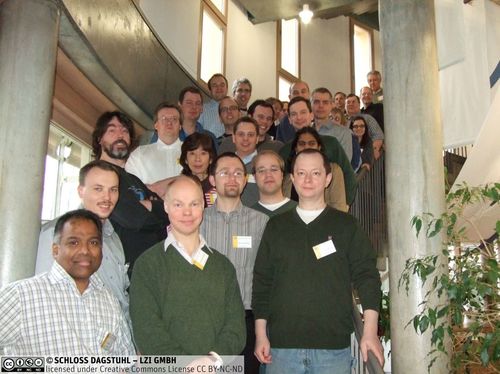Dagstuhl Seminar 09071
Delay and Disruption-Tolerant Networking (DTN) II
( Feb 08 – Feb 11, 2009 )
Permalink
Organizers
- Kevin R. Fall (Intel Berkeley Labs, US)
- Cecilia Mascolo (University of Cambridge, GB)
- Jörg Ott (Helsinki University of Technology, FI)
- Lars Wolf (TU Braunschweig, DE)
Contact
- Annette Beyer (for administrative matters)
Today’s Internet architecture and protocols, while perfectly suitable for wellconnected users, may easily experience serious performance degradation and entirely stop working in more challenged networking environments. Such environments are manifold, ranging from mobile users experiencing occasional or frequent disconnections to communication services for remote areas, to vehicular network communication in large areas, sensor networks to habitat or wildlife monitoring, and to space and underwater communications. These scenarios all share two commonalities: that an end-to-end path between two communicating nodes may not exist at any single point in time and that communication delay may be significant. Luckily, in most cases, delay in the delivery of the data can be tolerated. However, with the continued expansion of the Internet into new areas and the increasing penetration of communication technologies into more areas of life and technology, these environments become commonplace and are no longer restricted to exotic sensing applications but are quickly becoming relevant to consumers in everyday life.
Many attempts over recent years of incrementally fixing the Internet protocols in a bottom up fashion have only achieved partial successes: while mobile IP, HIP, transport, session, and cross-layer approaches may support changes of network attachments and short-term disconnections, a more fundamental approach is needed to address networking environments in which delays and disconnections may last for significant periods of time, and are the rule rather than the exception.
Delay-tolerant Networking (DTN) has taken a more encompassing approach to dealing with virtually all types of connectivity challenges, from bit rate to errors to delays to disruptions. By providing a novel communication abstraction that relies exclusively on asynchronous hop-by-hop message passing with no need for instant end-to-end connectivity, DTN concepts enable communications even under adverse conditions. This comes, however, at the cost of interactivity of communications, rendering any kind state synchronization or validation more difficult and raising new challenges. These include routing protocols – that need to operate under often unknown future conditions, security mechanisms – that can no longer carry out instant key derivation or validation even if a security infrastructure was in place, and application protocols and paradigms – that can no longer rely on simple lower layer abstractions promising (mostly) instant and reliable interactions.
Overall, the Dagstuhl seminar DTN II has provided the participants with a forum for fruitful discussion of present and future work on emerging networking applications and paradigms. The seminar has contributed to furthering the understanding of the perspectives of future development and real-world deployments of delay-tolerant networking as well as helped identifying issues – as research and engineering directions – to be resolved on this way.
- N. Asokan (NOKIA Research Center - Helsinki, FI) [dblp]
- Aruna Balasubramanian (University of Massachusetts - Amherst, US) [dblp]
- Christian Becker (Universität Mannheim, DE) [dblp]
- Carsten Bormann (Universität Bremen, DE) [dblp]
- Marcus Brunner (NEC Laboratories Europe - Heidelberg, DE) [dblp]
- Scott Burleigh (Jet Propulsion Laboratory - Pasadena, US)
- Augustin Chaintreau (Technicolor Research Lab. - Boulogne, FR) [dblp]
- Vania Conan (Thales - Colombes, FR)
- Elwyn Davies (Folly Consulting - Soham (Cambridgeshire), GB)
- Michael Doering (TU Braunschweig, DE)
- Avri Doria (Luleå University of Technology, SE)
- Lars Eggert (NOKIA Research Center - Helsinki, FI) [dblp]
- Kevin R. Fall (Intel Berkeley Labs, US) [dblp]
- Stephen Farrell (Trinity College Dublin, IE) [dblp]
- Thomas Fuhrmann (TU München, DE) [dblp]
- Philip Ginzboorg (NOKIA Research Center - Helsinki, FI)
- Janico Greifenberg (Dampsoft GmbH - Damp, DE)
- Gunnar Karlsson (KTH Royal Institute of Technology, SE) [dblp]
- Dirk Kutscher (NEC Laboratories Europe - Heidelberg, DE) [dblp]
- Sven Lahde (TU Braunschweig, DE)
- Jeremie Leguay (Thales - Colombes, FR)
- Anders Lindgren (Swedish Institute of Computer Science - Kista, SE) [dblp]
- Cecilia Mascolo (University of Cambridge, GB) [dblp]
- Johannes Morgenroth (TU Braunschweig, DE)
- Mirco Musolesi (University of St. Andrews, GB)
- Jörg Ott (Helsinki University of Technology, FI) [dblp]
- Mikko Pitkänen (Helsinki University of Technology, FI)
- John Solis (University of California - Irvine, US)
- Christian Tschudin (Universität Basel, CH) [dblp]
- Eiko Yoneki (Cambridge, GB) [dblp]
Related Seminars
- Dagstuhl Seminar 05142: Disruption Tolerant Networking (2005-04-03 - 2005-04-06) (Details)
Classification
- mobile computing
- security / cryptography
- networks
Keywords
- DTN
- simulations
- mobility
- MANET
- delay-tolerant networking
- ad-hoc networking
- routing


